1980s: Recapturing the Vision
Appeals of the Welsch class action lawsuit continued throughout the mid-1970s. Testimony on both sides of the issue was graphic and intense.
In September 1980, more than six years after the initial opinion was filed, the Welsch consent decree was signed.
Key provisions of the consent decree required the total population of residents living in state institutions to be reduced to 1,850 within seven years.
The state budget crisis of the early 1980s accelerated the regionalization agenda.
In 1981, the Rochester hospital was voted to be closed by the Legislature and AFSCME – whose members kept state institutions operating – went on strike.

Testimony in the Welsch class action suit was graphic and intense.

A strike by public employees strained the ability of state institutions to provide adequate care.
U.S. Senator Lowell Weicker Holds Hearings
U.S. Senator Lowell Weicker of Connecticut, chair of the first Senate Subcommittee on Disabilities, held hearings in April of 1981 to investigate best practices in caring for people with developmental disabilities.
Drawing upon national experts, Karen Green McGowan, a leading consultant in the field, testified about the power of developmental programming. When people do not learn, she said, they haven't failed, we have.

Karen Green McGowan
Prominent experts also challenged the current system. Bob Carl, Rhode Island's director of developmental disabilities services, told the panel that the technology and know-how existed to serve all people in the community. Only a lack of imagination and the will to make it happen stood in the way.
Other experts testified that even those with the most profound disabilities could be employed if given the right training. You could almost hear the myths regarding readiness to live in the community falling to the wayside.

Bob Carl
"People First" Groups Spring Up
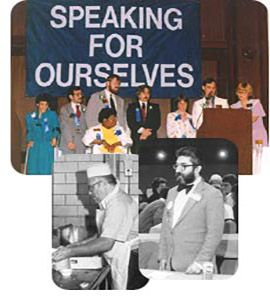
Irving Martin (left) and Cliff Poetz (right) helped give people with developmental disabilities a chance to speak for themselves.
In the early 1980s, the state Arc hosted consumer hearings around the state as "People First" groups sprang up across the country, giving people with developmental disabilities an opportunity to speak for themselves.
Cliff Poetz, Irving Martin and Gloria Steinbring spearheaded Minnesota's efforts.
All three individuals became national leaders in self-advocacy, serving on national boards and making presentations nationally and internationally.
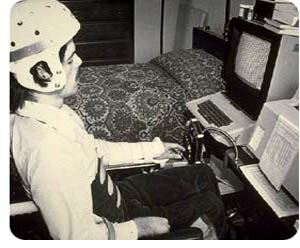
The Omnibus Budget Reconciliation Act allowed Medicaid to pay for services in individual's homes.
In 1981, Congress passed the Omnibus Budget Reconciliation Act, allowing states to apply for 3 year waivers so that Medicaid could pay for services provided in people's homes.
No one could have predicted that this waiver would eventually become the largest funding stream for people with developmental disabilities.
All three individuals became national leaders in self-advocacy, serving on national boards and making presentations nationally and internationally.
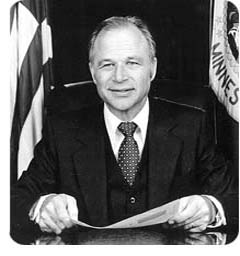
Governor Al Quie received a report calling for regional governance.
In 1982, the Department of Public Welfare submitted a report called "The Future of the Minnesota State Hospital System" to Governor Al Quie.
The report called for the creation of regional governing boards for state hospitals, removing the department from the facilities' day-to-day operations. The report also noted that no state hospital should close and that if funding reductions were needed, cuts should be made at all facilities.
A six-year plan to comply with the Welsch Consent Decree was issued separately. It called for changing the state's day program funding system and expanding semi-independent living services.
Sam Newlund Articles Relating to Welsch, Minneapolis Star Tribune (1984-1989)
Used with the permission of the Minneapolis Star-Tribune
Rochester Facility Officially Closes
The Rochester facility officially closed on June 29, 1982. Its remaining residents transferred to the other institutions.
The hospital closed in the "middle of the night" with little planning or advance warning.
That same year, the Minnesota Supreme Court ruled that group homes could be located in residential areas. This ruling furthered the community services effort by allowing people with developmental disabilities to live not only in the same county as their families but in the same neighborhood.
With attention now focused on planning, financing, and monitoring the independent living system, a number of concerned groups, including the Court Monitor's office and the developmental disabilities council, produced position papers outlining their needs, missions and visions for the future.
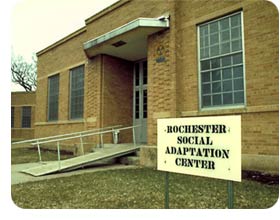
The Rochester State Hospital closed on
June 29, 1982.
The First Waiver Request
The first waiver request was submitted in 1983 whereby states could request Medicaid funding to move individuals from state institutions to local group homes or to prevent movement into institutions.
Reaction was swift and sure. Six bills to repeal the waiver were introduced within weeks of the Legislative session that opened in January 1984. Legislators feared residents would leave state hospitals so quickly that closures would happen without adequate planning.
Rep. Dick Welch summed up citizens' concerns, saying there was no plan in place and that they didn't want another "Rochester closure in the middle of the night."

According to critics, Perpich's support of using Medicaid to move individuals from state institutions lacked adequate planning.
State Hospital Study
Before closing any additional state hospitals, the Legislature called for a study of resident needs, energy use, buildings, costs, economic impact, employee preferences and options.
Over 5,000 people attended nine town meetings, facilitated by Miriam Karlins, in all local communities where state hospitals were located.
Tom Triplett and Gus Donhowe chaired a group of agency commissioners to develop a set of options.
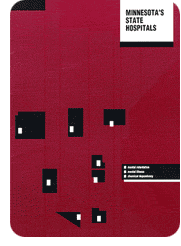
The state hospital study encompassed all facets of possible closures.






